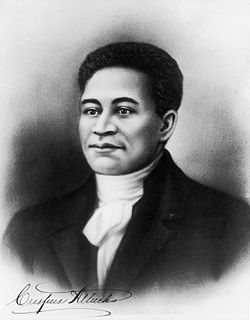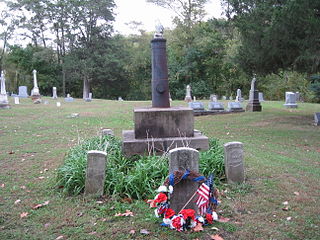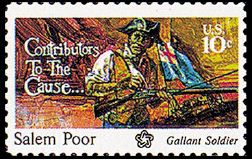 W
WJames Armistead Lafayette was an enslaved African American who served the Continental Army during the American Revolutionary War under the Marquis de Lafayette. As a double agent, he was responsible for reporting the activities of Benedict Arnold – after he had defected to the British – and of Lord Cornwallis during the run-up to the Battle of Yorktown. He fed the British false information while disclosing very accurate and detailed accounts to the Americans.
 W
WCrispus Attucks was an American stevedore of African and Native American descent, widely regarded as the first person killed in the Boston Massacre and thus the first American killed in the American Revolution. Historians disagree on whether he was a free man or an escaped slave, but most agree that he was of Natick and African descent. Two major sources of eyewitness testimony about the Boston Massacre published in 1770 did not refer to him as "black" nor as a "Negro"; it appears that Bostonians viewed him as being of mixed ethnicity. According to a contemporaneous account in the Pennsylvania Gazette, he was a "Mulattoe man, named Crispus Attucks, who was born in Framingham, but lately belonged to New-Providence, and was here in order to go for North Carolina."
 W
WA Black Patriot was an African American who sided with the colonists who opposed British rule during the American Revolutionary War. The term Black Patriots includes, but is not limited to, the 5000 or more African Americans who fought in the Continental Army during the war.
 W
WJeffrey Brace was a former slave who was taken from West Africa around 1750 and a veteran of the American Revolutionary War. He became the first African-American citizen of Poultney, Vermont. Brace became blind in his later years and published his memoirs under the title The Blind African Slave or the Memoirs of Boyrereau Brinch Nicknamed Jeffrey Brace. The faculty union at the University of Vermont now offers a $500 book award in his name "to students who exemplify academic excellence and an active commitment to achieving social and economic justice."
 W
WSeymour Burr (1754/1762–1837) was an African-American slave in the Connecticut Colony in the North American British Colonies and United States. Owned by the brother of Colonel Aaron Burr, who was also named Seymour, he was known only as Seymour until he escaped and used the surname Burr to enlist in the British Army in the early days of the American Revolution. The British promised the personal freedom of any African-American slave who enlisted or escaped to fight against the Continental Army, and Burr wanted more than anything to be free. However, he was quickly captured and forcibly returned to his owner.
 W
WWentworth Cheswell was an American assessor, auditor, Justice of the Peace, teacher and Revolutionary War veteran in Newmarket, New Hampshire. He was of mixed race and was listed in the census as white. Elected as town constable in 1768, he was elected to other positions, serving in local government every year but one until his death.
 W
WJude (Judas) Hall was an African-American soldier in the American Revolutionary War. He served from 1775 to 1783, thus earning his freedom from slavery. After the war, he married and settled in Exeter, New Hampshire, where his homestead is still known as Jude's Pond. Three of his children were kidnapped and sold into slavery, and two of his grandsons fought in the American Civil War.
 W
WPrince Hall was an abolitionist and leader in the free black community in Boston. He founded Prince Hall Freemasonry and lobbied for education rights for African American children. He was also active in the back-to-Africa movement.
 W
WLemuel Haynes was an American clergyman. A veteran of the American Revolution, Haynes was the first black man in the United States to be ordained as a minister.
 W
WAgrippa Hull (1759–1848) was a free African-American patriot who served as an orderly to Tadeusz Kościuszko, a Polish military officer, engineer and nobleman, for five years during the American Revolutionary War. He served for a total of six years and two months. After the war, he received a veteran's pension. It was signed by George Washington, and he treasured it for the rest of his life. Born free in Northampton, Massachusetts, in 1759 in the middle of the Seven Years' War, Hull became the most significant black landowner in Stockbridge, where he lived after the Revolutionary War. He lived to the age of eighty-nine.
 W
WThe Joe Frogger is a type of cookie that has been popular in New England since the late 18th century. It is flavored with molasses, rum, and spices and has a soft, chewy center. Because the cookies kept well they could be taken on long sea voyages, and so became popular with fishermen and sailors. The original cookies were the size of pancakes and were cooked in an iron skillet; those made today are typically smaller, and baked in an oven.
 W
WCato Mead is the only known Black Patriot buried west of the Mississippi River. Mead is buried in or near Montrose Cemetery in Montrose, Iowa.
 W
WSalem Poor (1747–1802) was an enslaved African-American man who purchased his freedom, became a soldier, and rose to fame as a war hero during the American Revolutionary War.
 W
WPeter Salem was an African-American from Massachusetts who served as a U.S. soldier in the American Revolutionary War. Born into slavery in Framingham, he was freed by a later master, Major Lawson Buckminster, to serve in the local militia. He then enlisted in the Continental Army, serving for nearly five years during the war. Afterwards, he married and worked as a cane weaver. A monument was erected to him in the late 19th century at his grave in Framingham.
 W
WPhillis Wheatley, also spelled Phyllis and Wheatly was the first African-American author of a published book of poetry. Born in West Africa, she was sold into slavery at the age of seven or eight and transported to North America. She was purchased by the Wheatley family of Boston, who taught her to read and write and encouraged her poetry when they saw her talent.